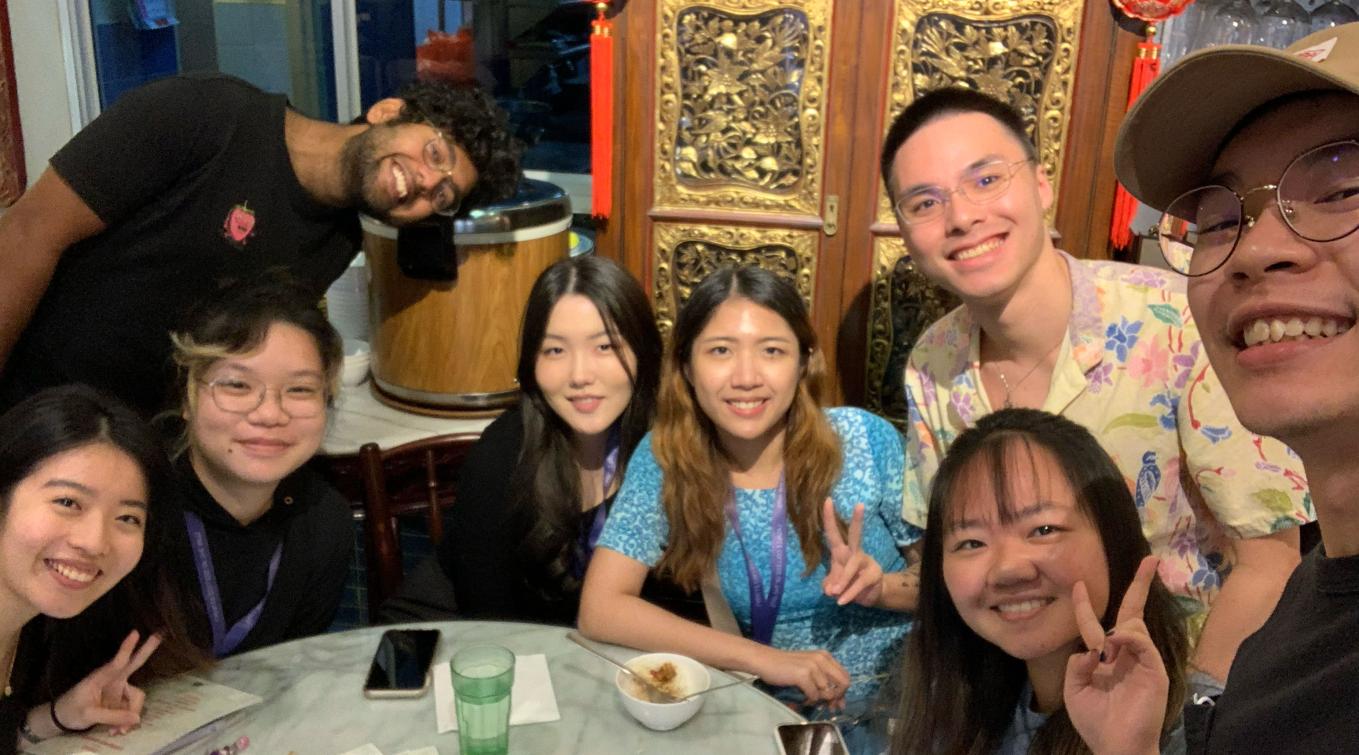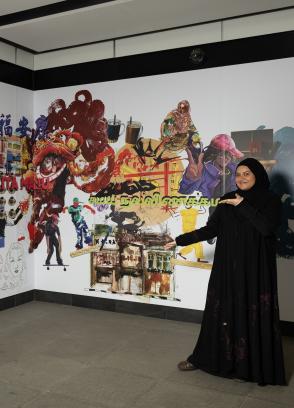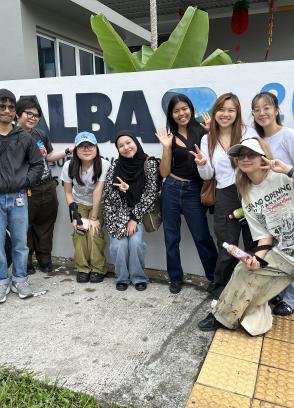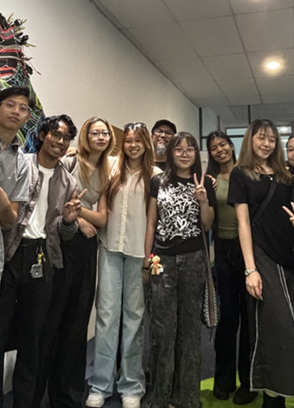From left: Carissa Huang, Ashley Han, Carla Castle and Megan Leow with Krish Nataraja from Strawberries Inc. and Patch and Punnet, Dylan from Peranakan Inn, Chermaine Tan Ting Ting, assistant stage manager for the ARTWALK dinner theatre programme and Wang Wen Han Zachery, videographer for the dinner theatre programme.
Part of Singapore Art Week, ARTWALK is an annual multidisciplinary public arts project organised by students from LASALLE’s BA(Hons) Arts Management programme. Guided by LASALLE’s Senior Fellow Milenko Prvacki, the students work with Singapore Tourism Board (STB) and a range of stakeholders to bring the event to life.
Inspired by the history and traditions of Singapore’s cultural precincts, ARTWALK presents a multisensory experience through artworks such as wall murals, workshops, music and performances. 2023 marked the ninth edition of the festival and its return to the streets of Little India and Katong-Joo Chiat post-pandemic.
We spoke with the team of five behind this year’s ARTWALK on their experience working on the project, what they’ve learned about arts management and their advice for juniors who take on future editions of the event.
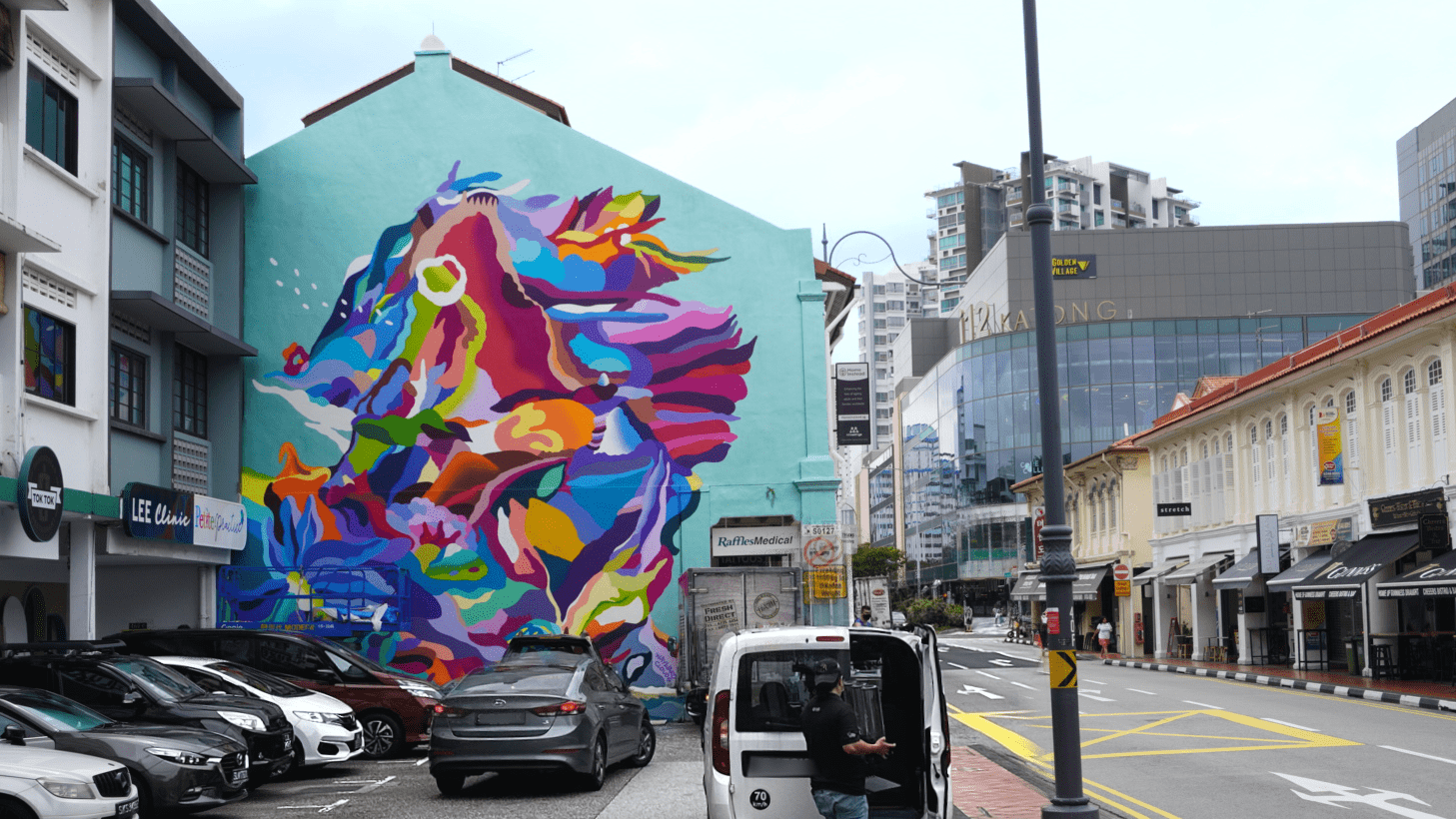
How did you get involved in ARTWALK?
Carissa Huang: When I joined the BA(Hons) Arts Management programme, one thing that I looked forward to learning was festival management. ARTWALK was a great opportunity for me to learn through experience—to jump in and try my hand at arts management. I’ve learnt a lot and also enjoyed the process.
Christina Cai: Back when I was a Diploma in Dance student, I had the opportunity to perform for ARTWALK 2020. Now as an Arts Management student, I knew I had to get involved when I was presented with the chance to organise the event—coming full circle to give back and contribute in another way.
Carla and Christina, having come from broadcast media and dance prior, how has being a practitioner informed the way you approach arts management? Did you feel like your artistic background aided you in the process of planning ARTWALK?
Carla Castle: I definitely found my film and media background very useful when managing the team for ARTWALK. As a director and producer, I naturally had to work with many artists of different disciplines. The cast, crew and stakeholders in film typically all have their different concerns, goals and agendas.
So coming into ARTWALK, and acting as the team leader, the producer in me naturally kicked in. My experience as a producer helped keep me level-headed and focused on the final product.
Additionally, that background has taught me to be really resourceful. The phrase ‘if it’s stupid but it works, it’s not stupid’ is pretty much my mantra. I think that mindset has helped me easily troubleshoot problems while also managing the budget efficiently.
Christina: Being a performer myself, I understood better the needs and wants of the performers and artists we worked with, as well as how to create the ideal and safe environment for them.
In the Diploma in Dance programme, we had the opportunity to work with artists of different disciplines, and this aided me in working with the diverse range of artists, to approach matters with an open mind. As the programming lead, my artistic background helped me come up with interesting ideas and explore ways for interdisciplinary collaboration.
How was the process like working and negotiating with multiple stakeholders like building owners and Little India Shopkeepers and Heritage Association? What were some takeaways from the process of engagement?
Megan Leow: In working with external stakeholders, I learnt the importance of building relationships, and presenting myself and what I represent (ARTWALK and LASALLE) in a professional and trustworthy manner. It was also very helpful to have the support from STB as well as our supervisor, to add credibility to us as project managers.
What part of ARTWALK's programming are you personally proudest of?
Ashley Han: During our initial planning stage, where we were confirming the programme line-up, we had some doubts and worries about the diverse and slightly overwhelming number of programmes. However, with the right attitude and amazing teamwork, the implementation was so much smoother than I had expected. We received a lot of positive feedback during the festival which made us feel very fulfilled.
Carla: I think the team did a fantastic job at curating the programming to the theme. We definitely managed to accomplish the goals we set for ourselves. Firstly, we wanted to refresh ARTWALK’s branding and programming, and use the theme ‘Echo’ to remind our audience that heritage isn’t something to just preserve and protect, but also something to develop and grow.
On a personal level, I’m proud of the fact that we accomplished such a varied and large programming, given that it was only five of us running ARTWALK this year. We were warned initially that this was going to be challenging (it definitely was), but it was a worthy one to tackle. It’s also really heart-warming that we had audiences who’ve attended ARTWALK annually tell us personally that this year’s programming was one of their favourites. So we definitely curated something that was enjoyable for everyone.
Megan: I am very happy that so many amazing artists joined us for this year’s programming. The outcomes exceeded our expectations and we are so grateful that some went above and beyond with their experimentation, just to create a more interesting experience for the festival-goers. We could sense that the artists were really enjoying what they were putting out, some trying out something new for the first time. And it really paid off from the positive responses we got from the audience!
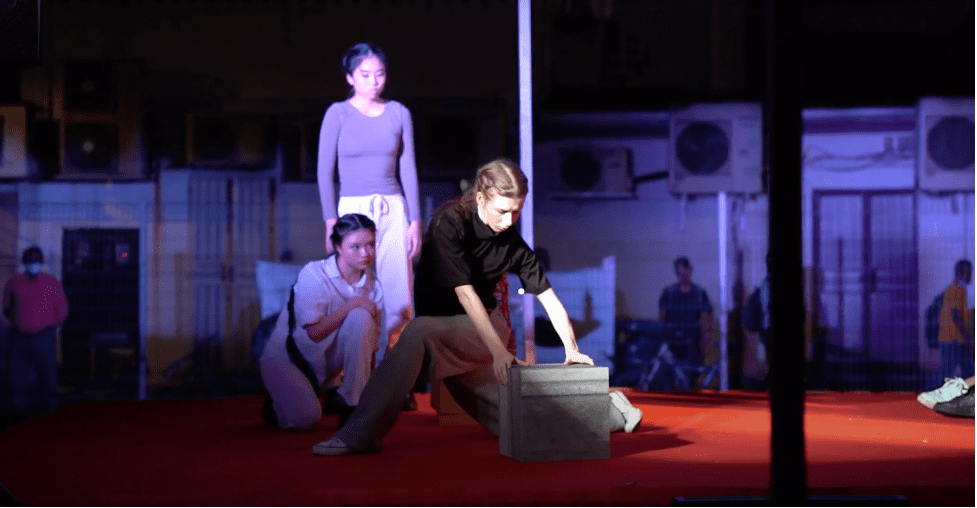
The role of an arts manager is multifaceted – part administrator, part artist liaison, part programmer, part events manager – how has the event changed the way you view your practice as an arts manager?
Ashley: Coming from a one-dimensional view of the arts—with experiences only in the visual arts sector—the multifaceted nature of the job was initially daunting, especially with only a small team managing the festival. Our team had designated roles for each member to distinctly categorise our priorities, and we communicated easily and filled in for each other when needed. By working together and interchanging roles when necessary, I learned that arts managers need to be adaptable and prepared to step out of their comfort zone.
Carla: I think the festival has definitely made me appreciate the role of an arts manager. Sometimes it feels like you have to be an all-rounder—you have to be good at people management, conflict management, project coordination, sales, marketing and so on. And we have to wear all these different hats while upholding the value of the programmes we present to the public, while balancing the needs and expectations of different stakeholders. However, what I realise is that no matter the stress and challenges we faced, one thing remained a priority for us—ensuring that the audience had fun.
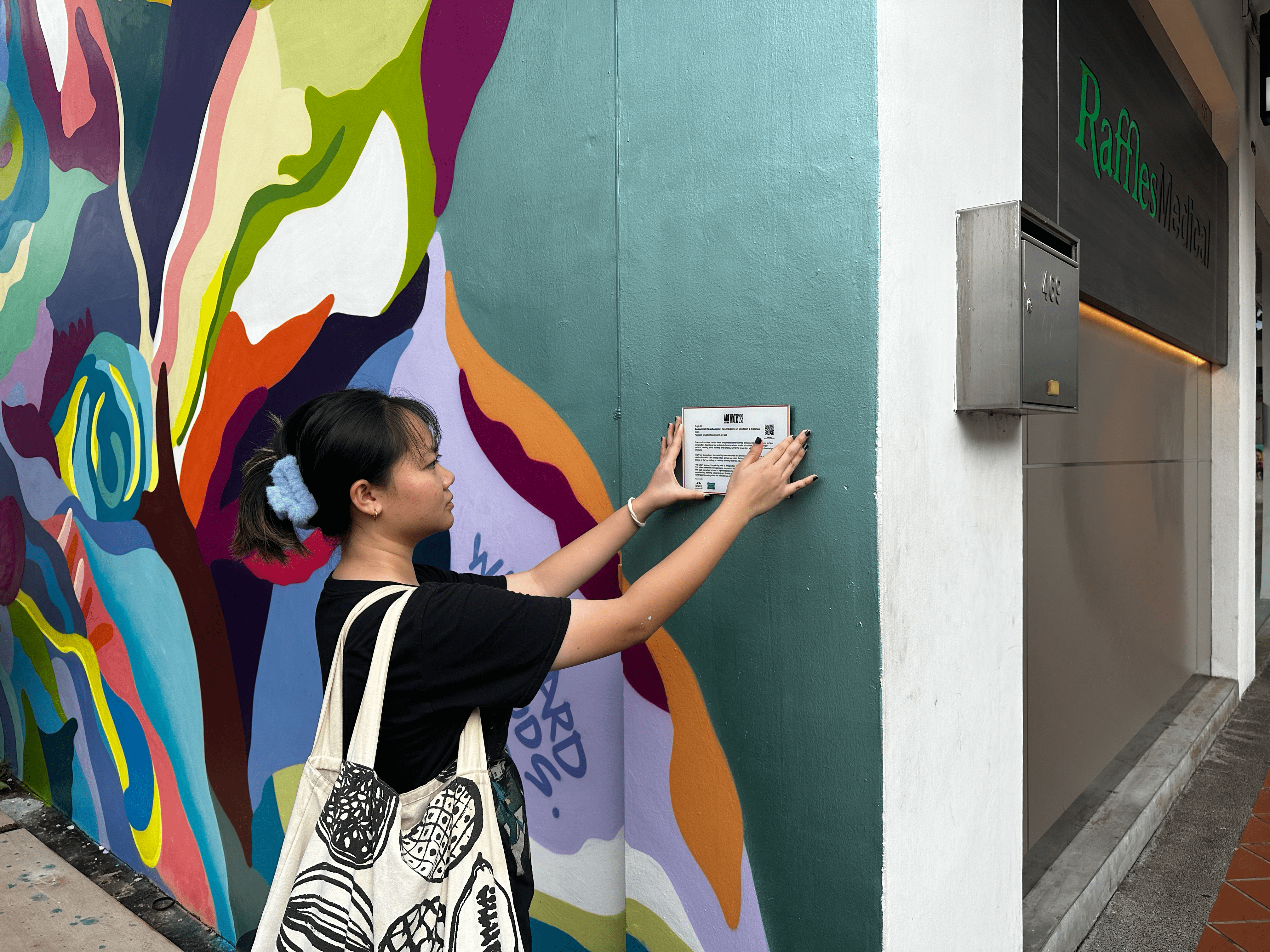
What advice would you give to your juniors who might organise future editions of ARTWALK?
Carla: I think the most important thing is to always be humble, and to focus on people’s strengths rather than their weaknesses. What made the dynamic of our team fantastic was that we all had a deep respect and understanding of each other and our abilities, strengths and weaknesses.
Additionally, I think everyone in the team can agree that we operated on an unspoken rule to give each other the compassion and space we needed to get things done. When a project has your name on the line, it’s very easy to get caught up in your ego and pride. However, all that truly needs to be left at the door. The best way to keep the team going and motivated is to always focus on what the end goal is.
Carissa: We are not only working with our stakeholders, but also with our teammates. Understanding and respecting each other’s personalities, working habits and roles makes it easier to work together as a team.
On the other hand, while hard work plays a great part, perseverance is also really important, at least to me personally. While there were times when everything seemed too hard, or there were a lot of things to do, the team stayed and pulled through the challenges to put together a successful event. So, don’t give up when challenges arise and your work will come to fruition in the end.

